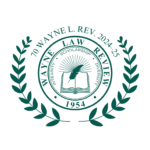The Bush and Obama Administrations’ Invocation of the State Secret Privilege in National
The launch of the Global War on Terrorism occasioned a new challenge to the Rule of Law. This challenge manifested itself in a series of legal memoranda and ensuing positions adopted by the George W. Bush administration in response to the capture and imprisonment of those suspected of carrying out the September 11, 2001 terrorist attacks. Many of the political policy formulations adopted by the Bush administration generated intensive debate over their merits, legality, and political viability. Among the most controversial policies are waterboarding and other “enhanced interrogation” techniques applied against foreign nationals detained abroad and at Guantanamo Bay; the practice of “extraordinary rendition”; the National Security Agency eavesdropping program without prior court approval; the self- proclaimed right to unilaterally launch pre-emptive war; enactment of the Uniting and Strengthening America by Providing Appropriate Tools Required to Intercept and Obstruct Terrorism Act of 2001; the usage of signing statements to evade congressional intent… Read More …
